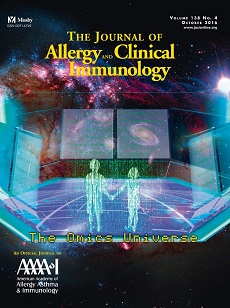CIC researchers find new drug more effective than Xolair

 A new study by researchers in AllerGen’s Clinical Investigator Collaborative (CIC) has shown that a developmental drug, QGE031 (ligelizumab), is three times more effective than Xolair (omalizumab) in reducing symptoms of mild allergic asthma.
A new study by researchers in AllerGen’s Clinical Investigator Collaborative (CIC) has shown that a developmental drug, QGE031 (ligelizumab), is three times more effective than Xolair (omalizumab) in reducing symptoms of mild allergic asthma.
The research, led by Dr. Gail Gauvreau, the CIC’s Co-Director and a professor in the Department of Medicine at McMaster University, was conducted by CIC investigators at six Canadian universities and one international site, and published in the October 2016 issue of the Journal of Allergy and Clinical Immunology.
QGE031, manufactured by Novartis, is a new monoclonal antibody that targets immunoglobulin E (IgE), a key protein involved in the allergic response. In susceptible individuals, exposure to allergens such as animal dander, dust mites, moulds and environmental triggers causes the production of IgE, which then binds to IgE receptors on inflammatory cells to cause narrowing and inflammation of the airways. QGE031 binds circulating IgE, preventing it from binding to IgE receptors, thereby limiting allergen-induced airway responses.
“We found that QGE031 bound IgE with a higher affinity than omalizumab and significantly elevated the dose of allergen required to elicit airway bronchoconstriction and skin prick test responses,” says Dr. Gauvreau. “These findings support the clinical development of QGE031 as an alternative treatment to omalizumab with an improved dosing frequency and potential for greater efficacy against allergic responses in the airways and skin.”
The CIC researchers tested the drug in a group of 37 subjects with mild allergic asthma and compared it to Xolair and placebo in a parallel-group, double-blind, placebo-controlled trial.
“While antibody treatment is typically reserved for severe asthma, this research may lead to an improved therapy for those with allergic asthma that have issues with inhalers or steroid-based medications,” adds Dr. Paul O’Byrne, who is Director of the CIC; Executive Director of the Firestone Institute of Respiratory Health (FIRH) at St. Joseph’s Healthcare Hamilton; and Dean and Vice-President of the Faculty of Health Sciences at McMaster University.
The Phase II study was conducted from November 2012 to October 2013 and involved the work of AllerGen CIC researchers Dr. Louis-Philippe Boulet (Laval University), Drs Donald Cockcroft and Beth Davis (University of Saskatchewan), Dr. Mark FitzGerald (The University of British Columbia), Dr. Richard Leigh (University of Calgary), Dr. Irvin Mayers (University of Alberta), Dr. Barbro Dahlén (Karolinska Institute, Stockholm, Sweden), and the collaboration of AllerGen investigator Dr. Christopher Carlsten (The University of British Columbia).
